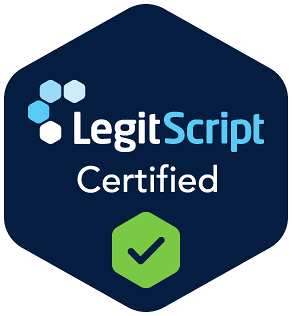Decades of clinical data show that medication-assisted treatment is the gold standard clinical approach to a safe, sane withdrawal from substances of misuse and an effective treatment modality for people in recovery from opioid use disorder (OUD) and alcohol use disorder (AUD).
The risk of relapse and overdose increases during the initial stages of recovery from substance use disorder (SUD) when withdrawal symptoms are at their peak. In some cases, the symptoms of withdrawal are extremely uncomfortable physically, psychologically, and emotionally. In other, rare cases – like withdrawal from chronic alcohol use – withdrawal can be deadly.
How MAT Helps Treat Addiction: Restoring Balance, Making Change Possible
MAT mitigates the symptoms of withdrawal, reduces cravings, and helps prepare you to engage in treatment. When you first stop using substances, you may not be ready to participate fully in treatment and recovery-related activities. The symptoms of withdrawal dominate your experience. Medication regulates brain chemistry and helps reduce circulating stress hormones in your body during this period. As time passes and your body, mind, and emotions move toward a new normal, it’s like waking up from a long sleep: you’re present, alive, and ready to engage in individual therapy, group therapy, and implement the lifestyle changes that lead to lifelong, sustainable recovery and sobriety.
What is Medication-Assisted Treatment?
The National Institutes of Health (NIH) and The Substance Abuse and Mental Health Services Administration (SAMHSA) offer the following definition of MAT:
“MAT is the use of medications, in combination with counseling and behavioral therapies, to provide a ‘whole-patient’ approach to the treatment of substance use disorders. Medications used in MAT are approved by the Food and Drug Administration (FDA) and MAT programs are clinically driven and tailored to meet each patient’s needs.”
It’s important to understand that MAT is about more than medication.
In the context of evidence-based treatment for substance use disorder, MAT is one part of a holistic approach to treatment. MAT goes beyond treating physical symptoms. An integrated MAT program addresses all the psychological, emotional, and social factors that play a role in addiction and/or the disordered use of substances.
The medications we use in MAT are buprenorphine, and naltrexone.
The supervised use of these medications can:
- Normalize chemical balance in the brain and body
- Block the action of opioids on the nervous system
- Prevent opioids from activating pleasure and reward centers in the brain
- Reduce physiological cravings for opioids and alcohol
- Restore balance to physiological systems
When used as directed, in combination with individual therapy, group therapy, lifestyle changes, and community support programs like Narcotics Anonymous (NA), evidence shows that for people with opioid use disorder and alcohol use, MAT programs:
- Reduce opioid use/relapse
- Reduce alcohol use/relapse
- Reduce risk of fatal overdose
- Reduce criminal activity related to drug-seeking
- Decrease spread of disease
- Improve ability to function in social, family, and school situations
- Improves treatment adherence, i.e. time in treatment
- Improve ability to seek and secure employment
In other words, MAT can make treatment and recovery a reality. If you’ve tried to stop using opioids or alcohol without success, MAT can help you through the withdrawal period, help you manage cravings, and give you a solid foundation in recovery. Most importantly, though, MAT can give you hope for the future and confidence that long-term, sustainable sobriety is possible.
When Do We Use MAT?
We use MAT when it would be dangerous or physically uncomfortable for you to go without medication to manage your symptoms. Each case is unique, and we learn about yours during our comprehensive pre-screen, intake, admissions, and assessment process.
We gather all the information that can have an impact on your health, and use that information to determine what treatment modalities best meet your individual needs and treatment goals. During your initial assessment, we collect the following information:
- Full alcohol/substance use history
- Alcohol/substance use disorder treatment history
- Full medical history
- Family medical history
- Current medication
- Your treatment goals
- Any relevant personal, family, cultural, or social factors that may affect your treatment experience
If MAT is indicated as an evidence-based intervention for your diagnosis and individual treatment needs, then we offer medication as one option among many. The circumstance when an FDA approved medication may be part of your treatment program include, but are not limited to:
- Detoxification and withdrawal from alcohol
- Detoxification and withdrawal from illicit opioids and most common substances of misuse, such as:
- Cocaine
- Methamphetamine
- Benzodiazepines
- Prescription opioids
- Long-term treatment for opioid use disorder (MAT for OUD)
If indicated, the following FDA-approved medications may be included in your treatment plan:
Medications for Opioid Use Disorder (MOUD)
Buprenorphine (Suboxone):
- Buprenorphine, also known as Suboxone, reduces or entirely eliminates opioid withdrawal symptoms and can reduce cravings for opioids. Patients can begin taking buprenorphine at either our Silver Spring and Towson offices, then may continue in any of our six offices. We do not charge an extra fee for buprenorphine prescriptions.
- Buprenorphine has been in use in Europe since the 1990s and in the U.S. since 2003. It’s called a partial opioid agonist because it partially occupies opioid receptors in the human brain. When it occupies opioid receptors, it reduces withdrawal and cravings but does not trigger the euphoria or high associated with prescription or illicit opioids. It also prevents other opioids from occupying those receptors, which means that while a person is on buprenorphine, other opioids have no effect.
Buprenorphine Extended Release (Sublocade)
Naltrexone (Vivitrol)
Naltrexone is available as a pill and extended-release injection (Vivitrol) which lasts for one month. It’s called an opioid antagonist because it completely blocks opioids from attaching to the opioid receptors in the human brain and prevents them from causing euphoria or any type of high. Taking naltrexone while an opioid drug is the body results in precipitated withdrawal because it removes any opioids from opioid receptors. For people who don’t want to take and opioid medication such as buprenorphine, naltrexone is an effective option.
Medications for Alcohol Use Disorder (AUD):
Disulfram (Antabuse)
If you consume alcohol while Antabuse is in your system, you have an extremely uncomfortable experience, which may include nausea, vomiting, headaches, sweating, flushing, and dizziness – and that’s the point. The medication makes drinking a horrible experience. Evidence shows that in combination with a comprehensive treatment plan, Antabuse can improve outcomes for people in recovery from AUD.
Acamprosate (Campral)
Campral first appeared in 1989 in Europe, where studies showed it can reduce relapse to alcohol use with no significant side effects. Campral can reduce preoccupation with alcohol and reduce the power of triggers for alcohol use, which dramatically decreases likelihood of relapse.
Naltrexone (Revia, Vivitrol)
Naltrexone plays a key role in treatment for opioid addiction and has recently been shown as effective in reducing relapse to alcohol use. Naltrexone can reduce cravings for alcohol as well as the pleasurable effects of alcohol, both of which reduce likelihood of relapse.
MAT: More than Medication
It’s important to understand that at Kolmac, the “M” in MAT is part of a larger treatment picture. If medication is a component of your short-term or long-term treatment plan, it works together with individual, group, and family therapy and counseling, lifestyle changes, and peer support to create a multimodal, comprehensive support system that promotes sustainable sobriety and leads to one goal: your overall health and wellbeing.
Medication-assisted treatment (MAT) can decrease stress and discomfort associated with withdrawal, lower the risk of relapse, and improve treatment outcomes.

